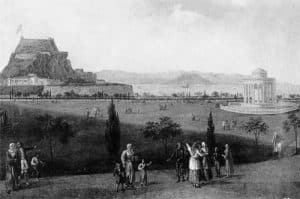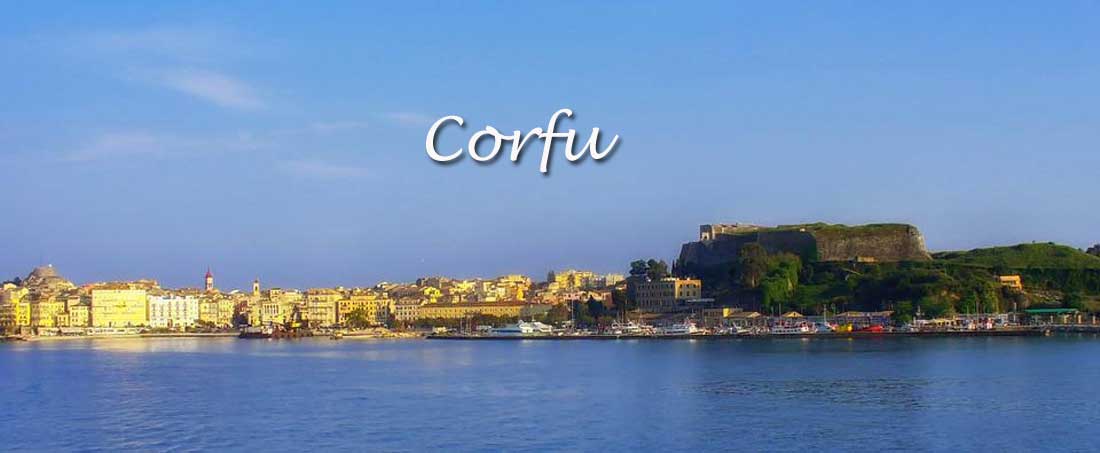History of Corfu island

Corfu has been the target of powerful conquerors since ancient times. The influences are visible in today’s Corfu, from the architecture and monuments to the temperament of the inhabitants and the local cuisine. The island has been inhabited since the Paleolithic Era. The first occupation was by the Eretrians and then by the Corinthians, who named the island Korkyra, which was the name of the daughter of Aesop, god of rivers. And Apollonius of Rhodes in his work Argonautica narrates that the island of Corfu represented a stopping place for Jason and the Argonauts in their feat of taking the golden fleece.
Mythology
The island is mentioned by Homer in the Odyssey, according to those who accept the identification of Sheria with Corfu, as the penultimate station that the resourceful Odysseus arrived shipwrecked, when he escaped from Calypso and on his way to Ithaca faced the wrath of Poseidon who transformed his ship into a rock forced Odysseus to seek refuge on the coast of Sheria which was then ruled by the Phaeacians. Nausicaa, the daughter of the king of the Phaeacians, Alkinou, went to the river to wash clothes with some female slaves. She met and helped Odysseus who, before continuing his wanderings towards his homeland, got to know and admire the beauties of the island of the Phaeacians.
Over the centuries it took many other names until it acquired the current Corfu due to the nymph Corfu daughter of the river Asopus. The god Poseidon fell in love with the beautiful girl, brought her to the island and gave it her name, from their love he gave birth to Phaiaca, the mythical progenitor of the Phaeacians. Many scholars believe that the myth of the nymph of Corfu is etymologically connected with the word Korifos from the acropolis located opposite the current capital. From the word Korifo came the Latin name Corfu, by which the island is known abroad.
The Ancient Times
During the Corinthian occupation, Corfu developed into a major commercial, naval and artistic power of the ancient world. In 585 BC the island regained independence.Ψορφθ allocated 60 triremes for the battles of the Persian War, while later in the Peloponnesian War (431-404 BC) allied with Athens, which resulted in the fall of the power of Corfu. In order to protect itself from pirates, Corfu accepted to be ruled by Rome, a rule that lasted until 337 AD. The island embraced Christianity in the 1st century AD.
Roman period
The first Roman period 229 BC – 339 AD. Internal disputes between Democrats and Oligarchs followed, resulting in the weakening of their power, so Illyrian pirates find suitable ground and occupy the island. The people of Corfu asked for the help of Rome and in a very short time the Romans landed on the island in 229 BC.
Typically Corfu had autonomy and the Romans used its port as their naval base, at that time the ruling class was formed by the Oligarchs and the whole island fell into decline.
In the first century AD, Christianity was also spread by the disciples of the Apostle
Pavlou Jason and Sosipatros. In 337 AD the Roman Empire is divided into three parts, the north (Spain, France, England), the east (Constantinople with all the eastern regions of Asia) and the west, which included Greece, Italy and its African regions empire. Corfu then belonged to the Western Empire.
The Middle Ages
In the Middle Ages it seems that the name Korifos prevailed and then Korifoi, from where today’s Corfu/Corfou comes. In 968 the bishop Liutprand of Cremona states: “Ad Coriphus parvenimus”. Koryfo must have arisen from the two rocky peaks that project imposingly above the city.
With the breakup of the Roman Empire, Corfu was united in 395 AD. with the Eastern Roman Empire. Ιn the Middle Ages, Corfu was plundered by the Huns, the Vandals, the Goths and the Arabs.
These raids ravaged the island, forcing the people of Corfu to seek safety in an area with two hills (from where Corfu got the name Corfu, from the “2 Peaks”). Later the island was in the possession of the Ormonds and finally it was liberated by the Byzantine Emperor Emmanuel Comnenus I’.
First Venetian Empire period
In 1204 the Venetians took possession of Corfu after the conquest of the Byzantine Empire by the Crusaders of the Fourth Crusade, but in 1214 the island returned to Michael I Aggelus Comnenus, Despot of Epirus, who restored the ancient rights of the inhabitants of Corfu and strengthened the fortifications of the island until 1258-1259 when the island was granted by Duke Michael II to his son-in-law Manfredo as a dowry.
The Battle of Benevento and the Treaty of Viterbo had the effect of transferring the sovereignty of the island for the next 120 years to the Andean or Anjou family. Charles I of Anjou had anti-Orthodox beliefs and thus replaced all Orthodox churches with Catholic ones. More and more residents of Corfu sought protection and safety between the two hills. During this time the Old Fort was built.
Second Venetian Empire period
Corfu again sought the protection of Venice in the second half of the 14th century, which bought the island from Naples and assumed its protection for the next 412 years. The administration of Venice consisted of members of a council who served for a short time and who were elected by Venice. During this time, the fortifications were strengthened again. In 1537, Turkish forces besieged the island, destroying large areas of crops and killing at least 20,000 Corfu people. Despite this, the island was not conquered due to its excellent defenses.
The New Fortress was built on the hill of Ag. Marcos from 1576 to 1645 and had some of the most advanced and dynamic war structures of the time. The fortifications were strengthened again with the construction of a second wall during the 17th century. Turkish forces attempted to invade Corfu again, but were repulsed by the Venetians.
First French Empire period
In 1797, Napoleon Bonaparte took over the administration of Corfu and the rest of the Ionian Islands and brought with him the ideas of the French Revolution. The municipal council was established with Spyridon Theotokis as its leader, the municipal library was created, the police, judicial and educational system were reorganized and improved, while the first Greek printing house was established.
The Russo-Turkish rule
Against the expansionist views of Napoleon in the East, the Russo-Turkish alliance was established which, taking advantage of the discontent of the inhabitants of Ionian Islands for the French, occupied the islands (1799-1807).
In March 1799, the Russian admiral Usakov, after a four-month siege, captured Corfu and temporarily assigned the governance of the island to group of nobles and some townspeople.
A particularly important event is the establishment in 1800 of the Ep=ptanisos State, the first Greek State after 1453, and its recognition as a state tax subject to the Sultan. The representatives of Eptanissos in Constantinople drew up a Constitution, called “Byzantine” and recognized by the the Sultan.
Great disturbances were caused by the change of the polity to an aristocracy and the exclusion of other classes from power. The Senate to deal with it
situation gave dictatorial powers to the president of Spyridon Theotokos, but the situation could not be effectively controlled.
The most important thing that happened during this period was the reconstitution of the institution of the Orthodox Bishop of Corfu. But with the recognition of the right due to Russia’s intervention in the internal and external policy of the Ionian State, the island lost its autonomy and Russia ceded the Ionian Islands to Napoleon at the signing of the Treaty of Tilsit in 1807.
The Second period of French rule
Napoleon further strengthens the fortifications of the island. The effects of French culture can be seen in the architecture and appearance of Corfu. Trees are being planted in Spianada Square and Liston to make the area look like the Rue de Rivoli in Paris. The French establish the vaccination of the inhabitants, introduce the potato, establish the School of Fine Arts and most importantly, establish the Ionian Academy, the first university of modern Greece.
The English rule
In 1814 the French surrender Corfu to the British. According to the Treaty of Paris, the Ionian Islands are recognized as an independent state under the protection of Great Britain. During the British rule the infrastructure of Corfu was improved, Greek was established as the official language, the Constitution was revised to include the free press and various artistic and financial societies were founded.
The Union of Corfu with Greece
Finally, Corfu joined Greece on May 21, 1864 after a decision of the Ionian Parliament and the ratification of the decision by Great Britain. Soldiers from the island participated in the Balkan Wars as well as the First and Second World Wars. In September 1943, the Nazi forces bombed Corfu, causing great destruction on the island. The Nazi occupation ended on October 9, 1944.
Modern times
Since then, Corfu has worked hard for the development of its natural resources and for the promotion of tourism, with the result that it emerged as one of the richest islands and turned into a particularly popular tourist hub.
